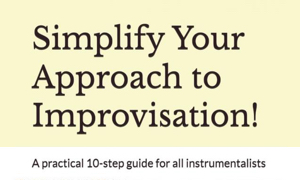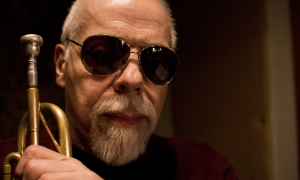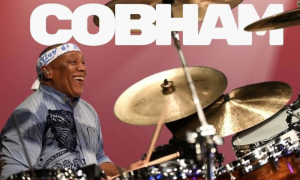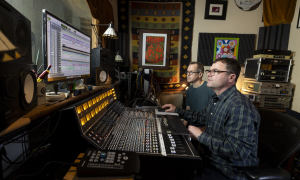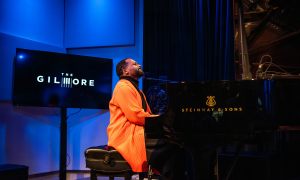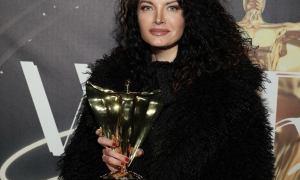 |
Nearly 50 years ago, a bright-eyed Ethiopian teen arrived in Wrexham, a county borough in the northeastern part of Wales. His parents had sent him nearly 4,000 miles from home to attend a renowned boarding school that welcomed a host of Ethiopians students. Young Mulatu Astatke quickly formed a bond with the school's band teacher, developing an interest in the trumpet and clarinet.
After graduation, Astatke set out for the big city, attending Trinity College in London and studying classical and jazz music before venturing across the pond to become the first African student at the Berklee College of Music in Boston. A less formal education followed, in the talent-laden jazz clubs of New York City in the mid-1960s with his own band, The Ethiopian Quintet.
Astatke's ten-year stint in the West would ultimately set him on a singular path. Just as the Nigerian artist Fela Anikulapo Kuti mixed African highlife with American funk into a potent blend called Afrobeat, Astatke returned to Ethiopia in 1968 with an entirely new sound to unleash on his homeland: Ethio Jazz. It was unlike anything heard before, chock full of Arabic, African, Latin and African-American influences, with the groove prominent in the mix, enveloped by a swirl of hypnotic, snake-charming brass, wah-wah guitar and an onslaught of percussion.
Astatke has taken his sound all over the world over the past 45 years, but his latest collaboration has taken him full circle. Recruited by DJ and promoter Karen P and the Red Bull Music Academy to play a show at London's famed Cargo club in April 2008, Astatke was linked with The Heliocentrics, a British jazz ensemble that has drawn rave reviews in recent years for its psychedelic, hip hop-inflected sound. The show went so well that the two parties agreed to make a record together, and the resulting album, the third in the Strut label's Inspiration Information studio collaboration series, hit stores earlier this month. Mulatu Astatke and The Heliocentrics: Inspiration Information 3 sees the master and his vaunted band explore their respective sounds but also meet somewhere in the middle, adding a harder, psych-rock tinge to Astatke's Ethio Jazz and injecting traditional Ethiopian instruments and Coptic Church chanting into The Heliocentrics' thick, fluid jazz compositions.
 |
When he picks up the phone at his hotel on a trademark cold, damp late winter evening in London, Astatke is at the tail end of a long day of rehearsals with The Heliocentrics, as well as an appearance on BBC 1 with tastemaker extraordinaire Gilles Peterson. Despite nursing a cold with a cup of hot tea and already in bed, the 64-year-old pioneer is a relentless fountain of positive energy, continuously using words like “beautiful" and “so great" to describe his 45-year career in music and his serendipitous connection with The Heliocentrics.
“It's been so nice and so great," he says. “It's incredible to see younger musicians playing Ethio Jazz. This has been a beautiful collaboration."
Astatke has enjoyed a surge in popularity in the West in recent years behind the soundtrack of Jim Jarmusch's film Broken Flowers in 2005, as well as the 1998 release of the fourth volume of Francis Falceto's monumental 21-volume Ethiopiques series, both of which leaned heavily on Astatke's instrumental arrangements.
But, his latest collaboration isn't a case of a bunch of young upstarts propping up an aging pioneer tenuously grasping at the days of yore. Astatke is fresh off a Radcliffe Institute fellowship at Harvard University, where he premiered part of a new opera he composed based on the musical traditions established by Yared, an iconic Ethiopian figure largely credited with establishing the country's musical framework. He is also in the midst of a project to modernize some of the traditional Ethiopian instruments, hoping to expand their sound without compromising their uniqueness, and is working on a solo album this summer.
“I've worked 24 hours a day to introduce Ethiopian music to the world, and to show what Ethiopians have contributed to the world in culture and music," he says. “I have enjoyed it so much. I've never been discouraged. I just keep on going and going, and this is the latest thing to happen for me. I'll never stop."
 |
“Music just needs the brain to work - you don't have to have big muscles or anything," he continues. “I can play up to 100. You look at the great European composers [and] their best work was done at the age of 80 and 90. Even Duke Ellington was doing beautiful work at the age of 80. It's all how you look at it. It's so beautiful, so nice."
Heliocentrics' drummer and co-founder Malcolm Catto first discovered Astatke's music back in 1994 while on a search for rare gems in New York City as part of his day job for Jazzman Records. But, it was in 2002, when French label L'Arome reissued Astatke's Ethio Jazz album, that Catto was floored.
“That was the one that totally blew me away," Catto says. “When I heard the Ethio Jazz album, I was like, 'Jesus Christ.' We all love that sort of rough edge to it. It had a rawness that opened our minds to using different scales in that music, incorporating different modes and scales."
The discovery sent Catto digging for Arabic and African influences to incorporate into The Heliocentrics' sound, a move that ultimately helped the band land the Cargo gig. Catto and company were just as blown away by how laid-back and easy to talk to the jazz pioneer was when they first met in the days leading up to the Cargo show.
“The guy is totally approachable and so easy to get along with," Catto says. “It wasn't any sort of James Brown sort of business."
Currently on tour in Europe, the band packs into a van with their gear on the road, with Astatke traveling in a separate car and the band members taking turns traveling with him.
“He's just one of the guys, really," Catto says. “He's so easy going you wouldn't believe. He's not in his own world and he doesn't have his own whole separate thing going on at all. He's just there amongst us. What you see is what you get. I like to think that we're all like that and that's why we connect because we basically all try to be fairly honest about it and just love the music."
The feeling is mutual, and Astatke and The Heliocentrics have already discussed future projects that would potentially have the band traveling to Addis Abba to record with more Ethiopian musicians.
“We have some traditional instruments on this record, but going there to work with them would be pretty amazing," Catto says. “We could take this as deep as we can get it, and Mulatu is up for that."





